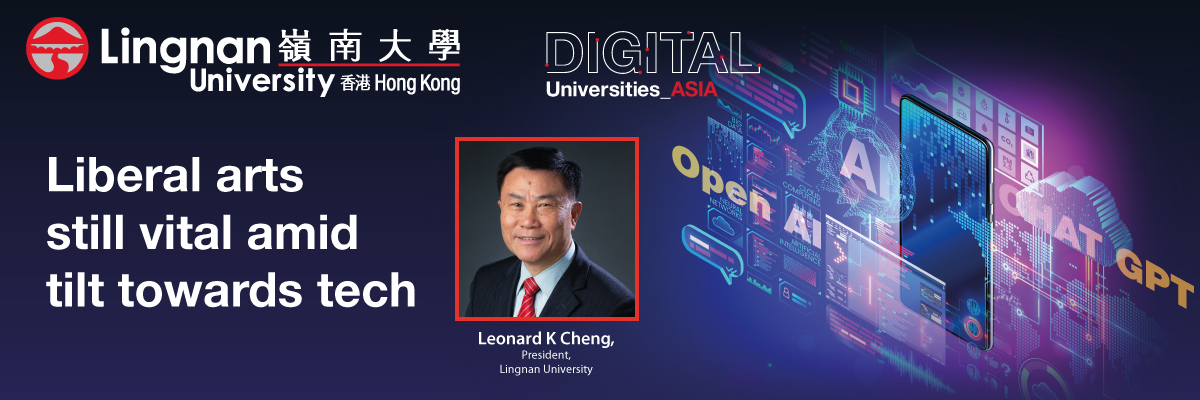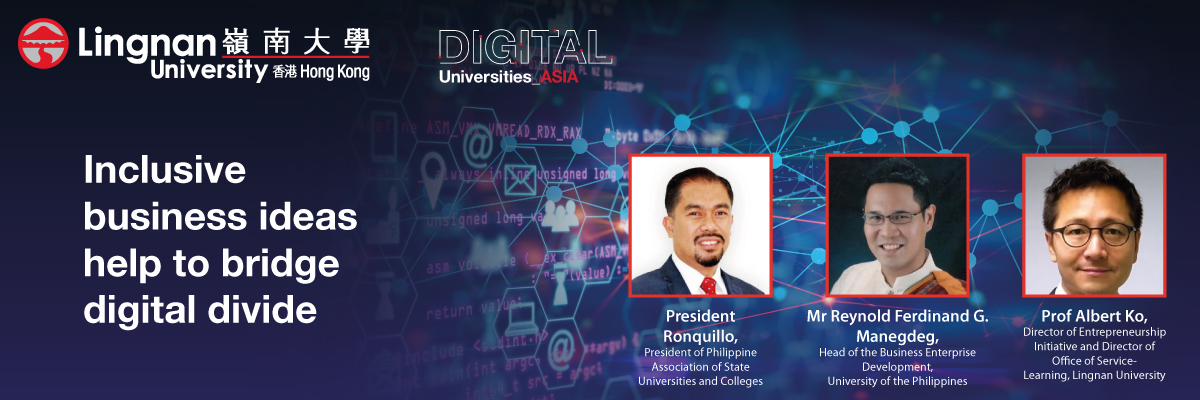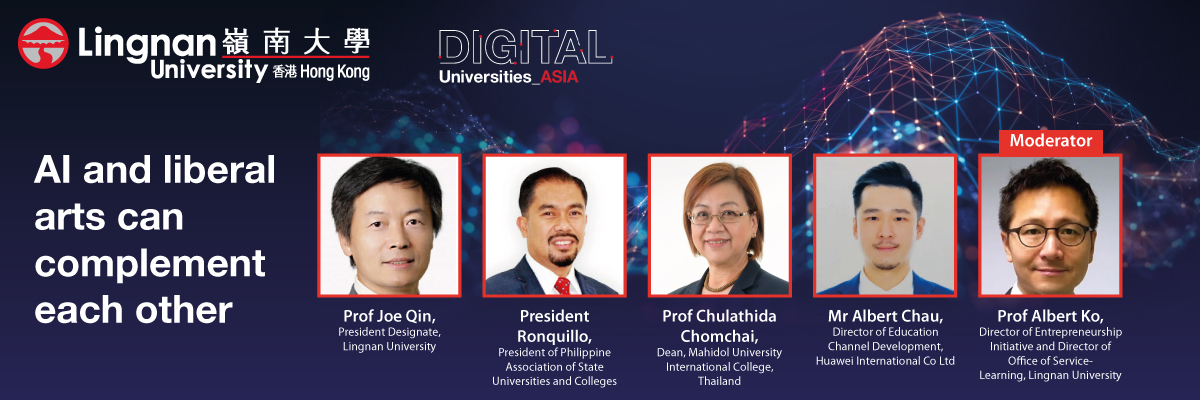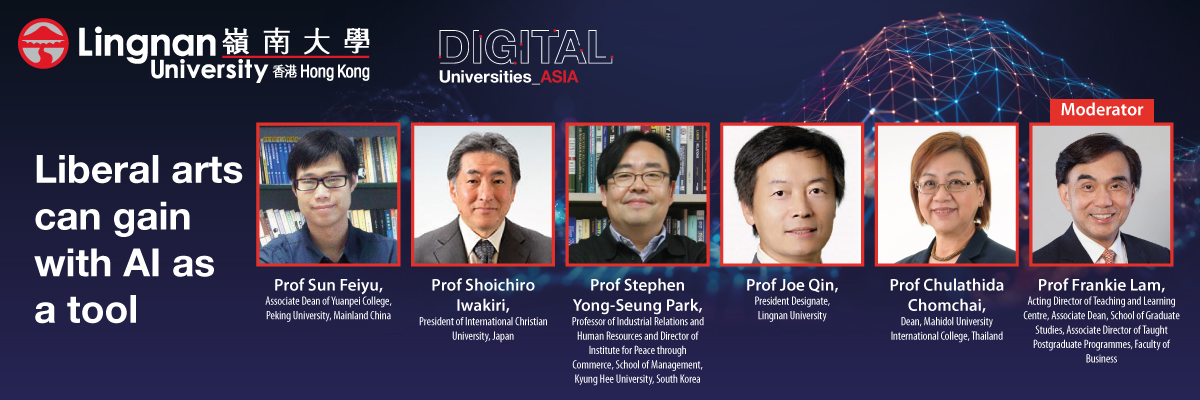Lingnan University participated in THE Digital Universities Asia event from 9-10 May 2023, in Kuala Lumpur
- President Leonard K Cheng delivered a keynote talk on the topic of 'The Critical Role of Arts, Humanities, and Social Sciences in an Increasingly Technological World.'
- The university also conducted a workshop on 'How Universities Can Apply Inclusive Business Practices to Address the Digital Divide and Inequality in Asia.'
- Led by Professor Albert Ko, a group of speakers participated in a panel discussion on 'How Liberal Arts Education Can Close the Tech Skills Gap.'
- A roundtable discussion was held behind closed doors to discuss key issues related to ‘The road ahead: Innovating in the liberal arts education with technology’.
Highlights

The rapid rise of AI and ChatGPT, with their use of automation and generative machine learning, has raised many questions about the implications for higher education and academic research.
These new technologies are already having an impact as universities consider the pros and cons of allowing faculty and students to use such tools and what rules or guidelines to put in place.
Beyond that, though, there is also the wider debate about how the latest tech developments will change the role and function of specific departments and even undermine the need for some of the more traditional subjects.
To get a better sense of where things may be heading, the recent THE Digital Universities Asia 2023 sought to address many of the more pressing issues. Held in Kuala Lumpur, the event brought together notable figures, with Lingnan University invited to host a half-day of sessions and panel discussions.
In his keynote talk, Lingnan’s President Leonard Cheng shared his views on the critical role of arts, humanities and social sciences in an increasingly technological world.
Clearly, with many employers increasingly STEM-focused when it comes to hiring, it is essential to understand how the basic skills acquired in a liberal arts education need to be adapted – and to take action accordingly.
In practice, the undergraduate curriculum for a modern-day liberal arts degree could be extended to include, say, engineering courses and other applied subjects. And tailor-made units or extracurricular activities could be added to give students the tech know-how to stay up to speed in that respect.
“Success with technology-driven innovations will be crucial to the prosperity, performance, and even the survival of many firms,” Cheng said. “And they need staff who can turn breakthroughs and improvements into products and services.”
He outlined certain hopes for the emerging era, known as Industry 5.0, which is seen as taking the world into the next phase of economic growth and development. It entails a vision of unlimited technological opportunities, which has captured the imagination of many business leaders, educators and policy advocates.
They foresee a coming bonanza in fields like robotics, automation, AI, smart machines, big data, and the internet of things (IoT).
However, this broad vision is not welcomed by all. It is criticised as a continuing surrender to “the rule of robots” and the boundary-less practices of today’s digital age, which already make it hard for workers to “unplug”. Also, with its single-minded focus on enhancing productivity and profit, this view of the future fails to take due account of other essential aspects of human existence, including personal welfare and the benefits of pursuing a diversity of social, cultural and intellectual interests.
So, many now suggest, what we need instead is “automation with a soul”, with the emphasis put on human-centricity, resilience and sustainability. The best way to achieve this is through study of the arts, humanities and social sciences – alongside tech-based disciplines – in order to gain the necessary balance, direction and insights.
“In higher education, we should welcome Industry 5.0,” Cheng said. “We need to learn what ChatGPT and AI can do and what the limitations are. These tools will be used in the workplace, so our students need to be trained to use them, and we ourselves must be prepared.
“In terms of building resilience, though, we also need students to understand the nature of disruption and uncertainty. They can then help to improve macro and micro policies, creativity, planned design; production processing, rearrangement and so on. And, for that, liberal arts subjects are indispensable.”
Cheng noted that universities also have a duty to pay more attention to advancing sustainability and preventing environmental degradation - the third pillar of the future economy. It is a big subject, one that goes well beyond the issues of industrial automation and flexible manufacturing and which raises questions about the very foundation of the free-enterprise, capitalist economic system.
“That’s why university education needs to include key elements of the humanities and social sciences to instil an appreciation of the importance of protecting our environment for sustainable development,” Cheng said. “Graduates must be informed citizens who can collectively promote social good and support necessary government policies, including taxes and subsidies deployed to increase social well-being.”


